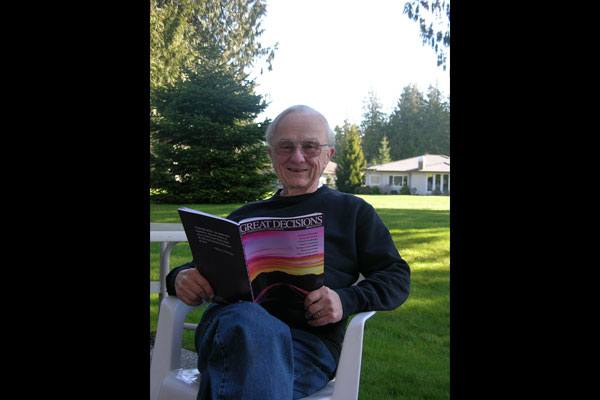Drones, cyberweapons, 3-D technology: They are part of the future of defense, but so are a fractious Congress, uncertain budgets and questions of ethical use.
That makes defense technology a perfect topic for the Sequim Great Decisions discussion group’s next meeting, 10 a.m.-noon Friday, March 7, at the Sequim Library, 630 N. Sequim Ave.
Open to everyone, the group provides a sociable way for people to talk about major global issues.
Sociability is key because the aim is real discussion, not debate.
“My desire is to have all political points of view present from the extreme right to the extreme left,” said current coordinator John Pollock, who has led the group since 2003. “No matter what the topic is — it could be birds — there will be differing opinions.”
The group holds itself to simple rules of discourse. The acting moderator must recognize the next person to speak.
All comments are made to the group as a whole and conversation remains civil even when members disagree.
“We really do our best to give everyone a chance to speak,” said longtime member Mura Glenn. “We can get very used to each other’s opinions, so we welcome new members.”
At each meeting, a group member presents a summary of the topic and then guides discussion. On March 7, the moderator will be Katherine Dunham who worked in intelligence for the Department of Defense.
The group got its start in the 1980s when Valdemar and Geraldine Johnson started a lecture series that met at the Presbyterian Church. With a wide network of academic and professional connections, Valdemar Johnson brought in experts to provide lectures and lead discussions on various topics.
When the Johnsons could no longer lead the group, Jack Wesesky took over as coordinator and the group began working with materials from the Foreign Policy Association, a 95-year-old nonprofit dedicated to increasing Americans’ awareness of foreign policy and global issues.
Based in New York, the FPA sponsors public presentations on foreign policy, including major addresses by U.S. presidents, and holds an annual World Leadership Forum for government heads.
Grassroots groups are crucial to the organization’s work. The motto “Informed citizens make great decisions” is the starting point for the FPA’s Great Decisions program, which for 60 years has sponsored discussion groups, lectures and courses across the country. Articles from its Great Decisions briefing book are the departure point for many groups such as the one in Sequim.
Members are encouraged to suggest their own topics and recommend resources for others to read before the meetings.
The membership is varied. Pollock was a 1940s Quiz Kid who went on to design systems for managing complex processes using digital computers; he worked with the Argonne National Laboratory and the Fermi Laboratory Accelerator and consulted on what became the Large Hadron Collider at Cern. “My hot button is science illiteracy,” he noted. “Life today requires the ability to understand the scientific method.”
Other group members include a bioengineering consultant, retired cabinet department employees and a deep sea diver. Meetings usually draw from 12-16 members, and, as Glenn noted, newcomers are welcomed.
“Varied backgrounds,” said Pollock, “bring a wide variety of experiences into the discussions.”
Upcoming topics:
March 21: The End of Hypocrisy: American Foreign Policy in the Age of Leaks
April 4: Israel and the U.S.
April 18: America’s Social Democratic Future
May 2: Turkey’s Challenges
May 16: The Unruled world: The Case for Good Enough Global Governance
June 6: Islamic Awakening
Aug. 1: Energy Independence
Sept. 5: Food and Climate
Oct. 3: China’s Foreign Policy
Nov. 7: U.S. Trade Policy



